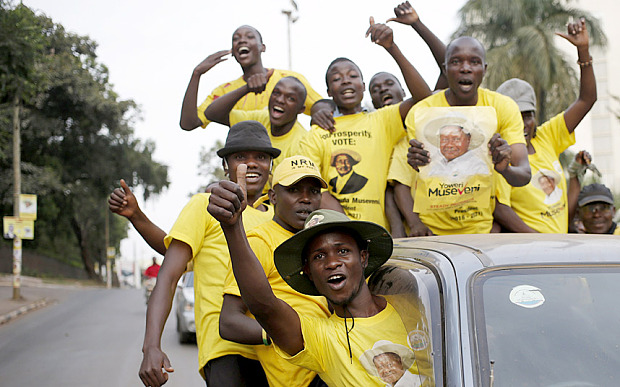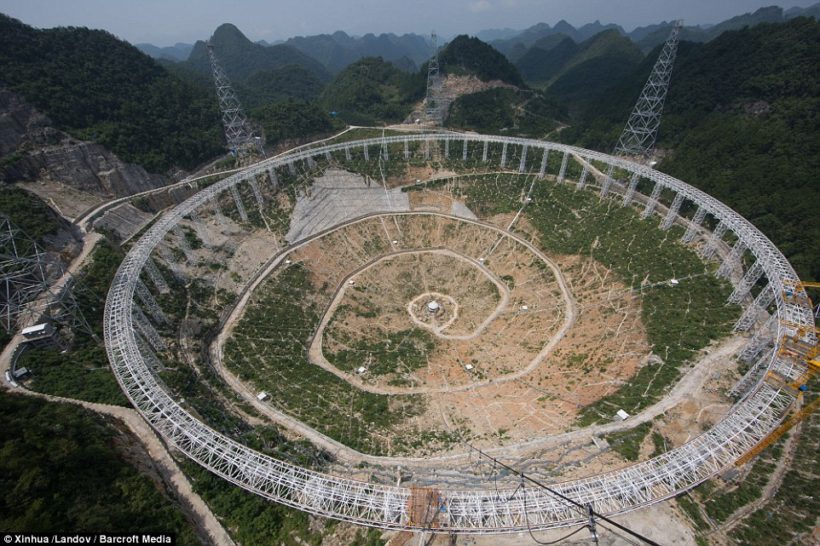News from Turkey, Uganda and China
Tuesday's World Events — Posted on February 23, 2016
TURKEY – NATO Will Send Ships to Aegean Sea to Deter Human Trafficking
(from The New York Times) BRUSSELS — With more than a million migrants having reached Europe in the last year and many more on the way, NATO stepped into the crisis for the first time on Feb. 11, saying it would deploy ships to the Aegean Sea in an attempt to stop smugglers.
But while the decision reflected the growing urgency of the situation, it was not clear that it would have much practical effect on the flow of refugees fleeing Syria’s five-year civil war: NATO said it would not seek to block the often rickety and overcrowded migrant vessels or turn them back, and military officials were scrambling to determine precisely what role their warships would play.
NATO’s secretary general, Jens Stoltenberg, said that “this is not about stopping or pushing back refugee boats.”
Gen. Philip M. Breedlove of the United States Air Force, NATO’s supreme allied commander for Europe, subsequently told reporters here that his staff was figuring out the rules of engagement and how to deal with refugee boats that are intercepted.
“This mission has literally come together in the last 20 hours, and I have been tasked now to go back and define the mission,” General Breedlove said. “We had some very rapid decision making, and now we have to go out to do some military work.”
Adding military muscle to what has largely been treated in Europe as a humanitarian issue reflected concerns across the Continent that further waves of refugees are likely to head toward Greece and beyond in coming weeks amid intensified fighting in Syria and improving weather. …
Calling on NATO to help patrol the Aegean was first raised as a possibility on Feb. 8 during talks between Chancellor Angela Merkel of Germany, whose country is the main destination for the migrants reaching Europe, and President Recep Tayyip Erdogan of Turkey, which is confronting a new mass of refugees along its border with Syria.

Officials said three NATO vessels, from Canada, Germany and Turkey, were being deployed to the Aegean Sea under the command of Jörg Klein, a German rear admiral. The group will focus on monitoring the waterways and on providing intelligence to the European Union. There was no indication that any vessels from the United States would participate directly in the effort.
NATO will also enhance its surveillance of the Turkey-Syria border, monitoring the movement of migrants and the activities of smugglers, officials said.
Ivo H. Daalder, a former American ambassador to NATO, said the military alliance had refrained from direct involvement in the migrant crisis before because European Union officials had insisted that they were handling the situation.
NATO has a track record of search-and-rescue and antipiracy efforts, but whether it can actually curb human traffickers in this case remains to be seen. While the migrants typically rely on people smugglers for help in getting to Turkey and then across the sea to Greece and onward to northern Europe, they are often determined to make the voyage alone despite the risks — and the people running the smuggling rings are rarely on the vessels they send toward Greece.
“The people piloting the ships from Turkey to Greece are relatively low-level people,” Jeffrey Rathke (a former NATO official) said. “But having Turkey and Greek vessels, led by Germany, will provide an opportunity for greater cooperation which, frankly, hasn’t functioned well to date.”
[NOTE: As reported by London’s Daily Telegraph, Turkish President Recep Tayyip Erdogan had long proposed the area north of Aleppo to the Turkish border – historically the heart of the Ottoman Empire whose towns and cities have remained closely linked to the economy of southern Turkey – as a “buffer zone” for the protection of Syrian refugees. However, he has been repeatedly rebuffed by the U.S. and Nato, but feels he is now being made to bear the brunt of the consequent destruction of the region by Russian bombs and Iran-supplied troops.
UGANDA – Yoweri Museveni wins Ugandan election as observers cry foul
(from London’s Daily Telegraph) – Uganda’s President Yoweri Museveni, in power since 1986, was re-elected for his fifth term on Saturday after winning an election marked by suppression and violence.
Mr. Museveni, the 71-year-old son of a cattle herder, won 60 per cent of the 9.7 million votes cast in the election, defeating his closest rival Kizza Besigye, who took 35 per cent, according to the Electoral Commission.
Election observers, who include the Commonwealth Observer Mission and the European Observer Mission, say the ballot fell short of key democratic benchmarks after the shutdown of social media sites Facebook and Twitter and the arrest of Mr. Besigye.

Supporters of Ugandan President Museveni celebrate his election victory in Kampala.

Dejected opposition supporters who work as motorbike taxi drivers hold their heads in their hands shortly after the election result was announced.
The EU Election Observer Mission said in a statement that Museveni’s ruling National Resistance Movement’s (NRM) political party’s domination of the political landscape distorted the fairness of the campaign and state actors were instrumental in creating “an intimidating atmosphere for both voters and candidates.”
The government’s Uganda Communication Commission blocked access to social media on election day which unreasonably constrained freedom of expression and access to information, it said.
“Intimidation and harassment of opposition by police and law enforcement bodies, as well as arrests of supporters and voters were reported from more than 20 districts,” the EU said. “Opposition candidates’ ability to campaign freely was restricted on several instances during the campaign period.”
Rioting broke out across the capital, Kampala, when news broke that the police had arrested Mr. Besigye, President Museveni’s personal doctor when they were guerrilla fighters, in his office for running an illegal parallel vote counting center.
Mr. Museveni, who is from the Banyankole ethnic group, helped Tanzania and other rebels oust the Ugandan dictator Idi Amin in 1979.
In 1981 he played a key role in the rebellion that ousted Milton Obote. He came to came to power in 1986 after defeating the military junta of Tito Okello.
His government brought stability and economic growth to Uganda, with donors eager to plough money into the country after decades of conflict.

In the late 1980s and early 1990s Uganda was hit by a massive Aids pandemic. Museveni was praised for overseeing a comprehensive Aids program, giving hundreds thousands access to prevention, treatment and care services.
In recent years. however, Museveni has become increasingly authoritarian, with his opponents accusing him of favoring his Banyankole tribesmen for important positions. …
Donors have also cut funding over Museveni’s banning of homosexuality. In 2005 Museveni signed signed a constitutional amendment prohibiting same-sex marriage. “Carnal knowledge against the order of nature” between two males carries a potential penalty of life imprisonment in Uganda. (see a Feb. 2014 “World Events” article)
CHINA – Thousands to be relocated in China to make way for world’s largest radio telescope
(from London’s Daily Telegraph) – More than 9,000 people in China will be forced to leave their homes to make way for the world’s largest radio telescope as part of the country’s ambitious hunt for aliens.
Authorities in south-western Guizhou province will relocate the families to make way for the launch of the world’s largest radio telescope. Guizhou is one of the poorest provinces in China.

The five-hundred-metre (1,640 foot) Aperture Spherical radio Telescope under construction in Pingtang county in southwest China’s Guizhou province.
The 1.2 billion yuan ($180 million) project is designed to detect signs of extraterrestrial life. To do that effectively, state-run Xinhua news agency reported that officials will “evacuate” all homes within three miles of the radio telescope. Li Yuecheng, Guizhou’s senior Communist Party official, said this would help “create a sound electromagnetic wave environment.”
Xinhua reported that 2,029 families, a total of 9,110 people from Pingtang County and Luodian County will be affected.
It added that officials would compensate each resident 12,000 yuan ($1,839) and ethnic minorities with “housing difficulties” get an additional 10,000 yuan ($1,532). …
Forced relocation to make way for infrastructure projects is common in China and affected residents often complain about the eviction and inadequate compensation.
Coverage of this project in the communist government’s state-controlled press has been focused on China’s technological advances. According to the China Daily, the telescope is unique because of its 4,500 panels, mostly triangular shaped that create a parabolic shape.The panels can move and alter the shape of the antenna, which picks up signals from far off corners in the universe.
“With a larger signal receiving area and more flexibility, FAST will be able to scan two times more sky area than Arecibo, with three to five times higher sensitivity,” Li Di, chief scientist with the National Astronomical Observatories told China Daily. “Ultimately, exploring the unknown is the nature of mankind, which is as [instinctive] as feeding and clothing ourselves. It drives us to a greater future,” he said.

Construction on the 500m Aperture Spherical Radio Telescope or FAST began in 2011. It is being built in the Dawodang depression in Guizhou Province where the natural landscape provides the perfect size and shape for the construction of the telescope. The ground also provides enough support for the gigantic telescope.
The porous soil forms an underground drainage system that protects the telescope. With only one town in the 12 miles radius, the Dawodang depression is extremely isolated from magnetic disruptions. The remoteness of the location also protects the surrounding landscape from any damage.
Once it is completed in September, the telescope will measure 500m in diameter, which dwarfs the 300m-diameter Arecibo Observatory in Puerto Rico. The Chinese FAST will be able to survey the outer space ten times better than Arecibo.
(The news briefs above are from wire reports and staff reports posted at The NY Times on Feb. 11, London’s Daily Telegraph on Feb. 20 and Feb. 17.)
Background
TURKEY - ON NATO: The North Atlantic Treaty Organization (NATO) is an alliance of 28 countries from North America and Europe committed to fulfilling the goals of the North Atlantic Treaty signed on April 4, 1949. …The fundamental role of NATO is to safeguard the freedom and security of its member countries by political and military means.
London’s Daily Telegraph reports on NATO's announced involvement:
The Standing Maritime Group is a force used by Nato to respond to crises around the world, and is usually made up of Nato members with a significant navy, including Britain, the US, Spain, Canada, Holland, Norway, Italy, Greece and Turkey. When not on crisis duty they work together in military exercises.
Gerry Northwood, a former Royal Navy captain who commanded the UK counter-piracy force off Somalia...told The Telegraph on the possible success of the mission in fighting people-smuggling: "It is not going to be easy. The distances are short and you have so many islands, which cumulatively is a massive coastline to be protecting. But one shouldn't underestimate the value of deterrence, and once you establish good intelligence networks you get results."
It would also probably mean that Nato would have to downscale its anti-piracy mission off the Somali coast and Indian Ocean, where piracy has ebbed away in recent years as commercial ships have begun to deploy armed guards.
"There is a risk that Nato are starting to spread themselves quite thin, and it means that Nato is unlikely to be a player for much more in the Indian Ocean, which is currently relatively quiet," he said. "Then again, you have to bear in mind that the Somali pirates will be listening to what is going on, and ensure that they cannot exploit the situation."
People Smugglers: NATO Warships Can't Stop Us (from Britain's Sky News, Feb. 16) -
- People smugglers in Turkey have told Sky News NATO's warships will not be able to stem the flow of migrants and refugees heading across the Aegean Sea to Europe, or disrupt their networks.
- Mohammed has been involved in the human smuggling trade for the last two years. He says the gangs are too well organized and there's too much money involved for it to be halted. "The smuggling will not stop - as long as people want to be smuggled the smuggling networks will continue to operate," Mohammed told Sky News.
- "Turkey has tried to stop it but we the smugglers are well prepared and are always one step ahead. We don't bribe the police but if one policeman or two finds out about our operations they will come to the smuggler and tell him we know what you are doing - then the smuggler will bribe him with a few hundred dollars."
- NATO says its mission will not be involved in rescuing migrants, or turning their flimsy crafts around and away from Europe.
- With such a long stretch of coastline it is hard to see what difference the operation will make.
- On one of Izmir's (Turkey) busiest streets the smuggling business is conducted in plain sight. Syrian families wait on the streets whilst the men disappear into back alleys to cut deals with the traffickers. The winter rate is between £5 and £600 per person.
- In the last few weeks trade has picked up dramatically despite the dangerous seas - it is a simple case of cause and effect. The worse the bombing, the more desperate people there are on the move. And at the moment the bombardment in and around Aleppo is massive.
- Syrian refugee Abu Mohammed and his family fled from the city last week. He says at the moment there is a mass exodus. He wants to go to Germany and start a new life. "The Russian offensive has made life impossible in Aleppo," he said. "We couldn't stay. Even my sister, who's in Azaz near the Turkish border, is not safe from the bombs. The Russians are just cleaning up everyone."
- The Turkish authorities say they are trying to disrupt the smuggling networks. But with Syria disintegrating demand for their services will only keep growing as more refugees make their way to Europe.
CHINA
- A radio telescope is a form of directional radio antenna used in radio astronomy.
- The same types of antennas are also used in tracking and getting data from satellites and space probes.
- In their astronomical role they differ from optical telescopes in that they operate in the radio frequency portion of the electromagnetic spectrum where they can detect and collect data on radio sources.
- Radio telescopes are typically large parabolic ("dish") antennas used singly or in an array.
- Radio observatories are preferentially located far from major centers of population to avoid electromagnetic interference (EMI) from radio, TV, radar, and other EMI emitting devices. This is similar to the locating of optical telescopes to avoid light pollution, with the difference being that radio observatories are often placed in valleys to further shield them from EMI as opposed to clear air mountain tops for optical observatories. (from wikipedia)
